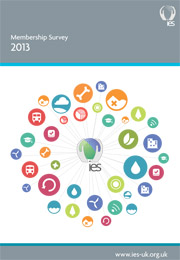The Institution of Environmental Sciences (IES) surveys its members annually to identify trends in how different services are valued and to gather members’ opinions on potential new future developments.
Method
In February 2013 an online questionnaire was completed by 261 members, answering questions on the importance of membership services and seeking opinions about publications and staff service.
These results were aggregated and compared against previous years to identify long-term trends.
Key findings
All of the services were rated as at least ‘important’ by more than half of the membership. This suggests that the IES is successfully meeting the needs and interest of members through the current provision of services. Members’ opinions on individual services were analysed in further detail:
Post-nominal: 83 per cent of respondents rated the post-nominal as ‘important’ or ‘very important’.
Chartership: These opportunities are highly valued by members, with the Chartered Environmentalist (CEnv) rated by 88 per cent of respondents as ‘important’ or ‘very important’, and 76 per cent valuing the Chartered Scientist (CSci) as such. Both the ratings of the CEnv and CSci designations have increased by 6 per cent from last year. We speculate that this is a reflection of greater recognition of charterships by employers and that the desginations are becoming increasingly important in the current economic climate where employment opportunities have been in decline.
Careers support: These services received their highest ever rating in 2012, with 72 per cent of respondents rating this service as either ‘very important’ or ‘important’. This is likely to be, in part, a reflection of the current economic climate. These services are of high value to members who are recently graduated or seeking work in the environmental science sector.
Journal: The environmental SCIENTIST is highly valued by almost all the membership (91 per cent stated it was ‘important’ or ‘very important’). This publication has been consistently been rated as ‘excellent’ or ‘good’ by approximately four fifths of respondents over the past five years. 51 per cent of respondents stated that the journal has improved since 2011, which reflects the well received redesign in 2011 and subsequent layout and editorial improvements, changes which sought to make the journal more accessible and engaging for all the membership.
Newsletter: 75 per cent of respondents rated it as either ‘excellent’ or ‘good’. The newsletter has been consistently rated as good and important. This reflects the project office efforts to ensure the newsletter is relevant and informative. Despite the improvements the office remains focused in 2013 on continued revision of the newsletter content and layout design.
Website: 65 per cent of respondents rated the website as ‘excellent’ or ‘good’. Use of the website has increased consistently over the past five years, with 68 per cent of members now using the website at least once per month or weekly. In early 2012 the IES launched the new website with considerable improvements on the old design. 81 per cent of members who visited the new site rated it as ‘excellent’ or ‘good’.
Interaction with IES staff: Excellent customer service is of great importance to the IES. Members have rated interactions with the IES staff as consistently high over the past 5 years. In 2012, 94 per cent of members who had interacted with IES staff rated their experience as either ‘excellent’ or ‘good’. Increased office capacity and further developed expertise of IES staff has ensured improvement of the quality of customer service in recent years.
Conclusions
This survey demonstrates that services remain highly valued by the membership and are continuing to improve in quality. In 2013 the IES is committed to continue to maintain current standards and develop new services that continue to meet the needs of members.


